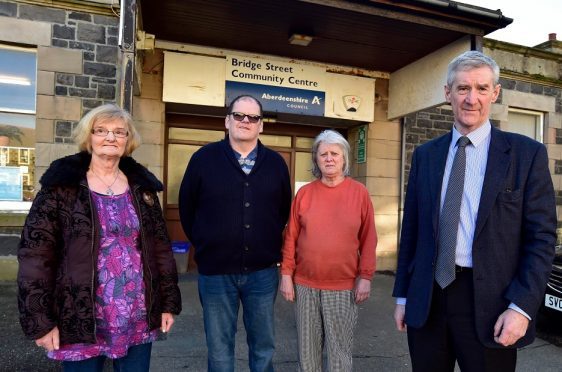Aberdeenshire Council has been accused of abandoning a vulnerable group – leaving them feeling like they have “fallen through a chasm”.
The Arches, in Banff, helped people who suffered from depression and anxiety for more than 20 years before it folded last year.
The closure was a result of the local authority’s shake-up of mental health provisions, which has involved a move from centre-based help to targeted support to those in the greatest need.
Council officials said no one would lose out when the Scottish Association for Mental Health took over from Mental Health Aberdeen – who declined to renew the contract amid concerns about the proposals.
But last night, former members of Archers claimed they felt they had been “robbed” by the council.
About 60 people attended the group for help and support last year, but now only about 12 of those keep in contact.
They have had to form their own peer support group to try and help each other.
Member David McKay, who suffers from depression, claimed he was offered just six half-hour sessions as part of the new council provision.
Previously, he had been prescribed 12 one-hour sessions.
“There seems to be very little compassion and understanding about how, for instance, depression hits people,” he said.
“It’s depression and anxiety that I suffer from. It’s an illness.
“Every single piece of support we have had is completely gone. We haven’t fallen through a crack, it’s been a chasm.”
Fellow member Melanie West accused the council of passing the buck, adding: “All they want to do is blame MHA for not taking up the tender and they weren’t willing to listen to anyone else.
“It’s been made quite clear that we would get help to set up our own group, but it would be up to us to finance and manage.
“And, quite frankly, when you’re not well, you are not able to do that.”
Another member, who did not want to be named, branded support for mental health in Banff under the changes as “devastating”.
“The new provider can only do what they agreed to do with the council, so it’s the council that’s at fault – they’ve robbed everything from us,” they said.
“A lot of people are really struggling. There were about 60 people on the books at the Arches. Now only 12 of us are meeting here. We were told that we had nothing to worry about.”
Local MSP Peter Chapman described the situation as “completely unacceptable”.
He said: “I was given assurances at the outset of this process that there would be a smooth transition and that service users would barely notice the difference.
“The fear at the time was that some vulnerable people could fall through the cracks.
“The reality on the ground now in places like Banff and Peterhead is that is exactly what is happening. The safety net has gone and people simply feel abandoned.
“That is not what was promised, and I intend to take this up with the chief executive of Aberdeenshire Council at the earliest opportunity.”
A spokesman for Aberdeenshire Council last night said the new arrangements would “take time” to become fully operational.
“We of course acknowledge that a small number of people remain anxious about the change of provider and new model of delivery,” he added.
“However we continue to highlight that the new service is more personalised, more recovery focused, better linked to employability, accessible seven days per week, available across Aberdeenshire as a whole, includes people who live with autism and also promotes community inclusion.
“The new model also includes enhanced mechanisms for service user feedback, through group advocacy, and we will of course take a close interest in feedback received on an ongoing basis.
“We continue to encourage anyone who requires support to contact SAMH, or to contact our community mental health team and we will offer an assessment of needs. It is also important to note that although this is a very important part of service provision this contract represents less than 10% of the council’s annual investment in mental health provision.
“Community mental health teams will happily offer advice and support to anybody looking to access alternatives.”
